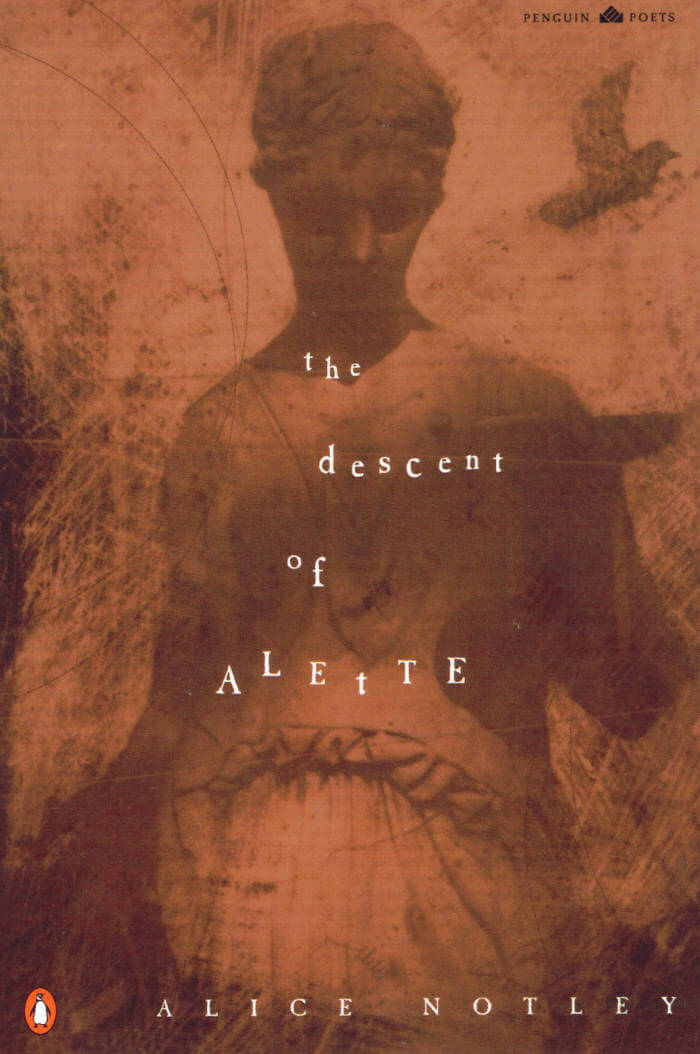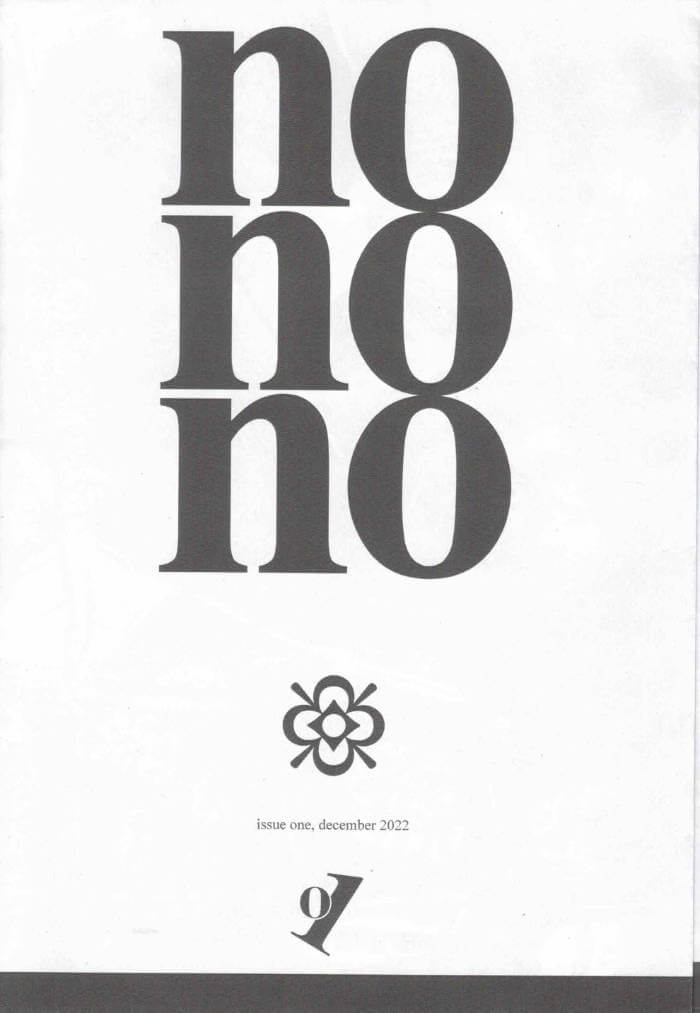

recommendations

Drafts
A weaving draft is a kind of notation for planning and sharing woven textil structures. The threading, along the top, shows how the warp is threaded through the heddles and frames; the treadling, along the right-hand side, show the order in which the treadles of the loom are to be pressed; and the tie-up, in the upper right-hand corner, shows how each treadle interacts with the loom’ frames. The drawdown, in the lower left, shows whether the warp or weft will be on top at any particular intersection of threads—thereby providing a “preview” of the completed textile. Often a draft diagram will indicate the intended color of the warp and weft threads, and the drawdown will show the completed textile’s color patterns. In “Drafts,” Allison uses letters instead of colors, melding digital weaving with writing.
WITHOUT THE E is a series of pamphlets responding to a presence or an absence felt in contemporary digital culture.

as the non-world falls away
as the non-world falls away is set of fragmented poetic compositions, created through iPhone scans of the artists notebook that have then been worked over digitally, testing the boundaries between image and text in a palimpsestic manner
WITHOUT THE E is a series of pamphlets responding to a presence or an absence felt in contemporary digital culture.

A Catalogue of Risk
Alisha Mascarenhas’s A Catalogue of Risk is a volte-face of the neoliberal market economy’s construction of isolated, individual safety. In her debut book of poems, Mascarenhas lingers in the question of risk as it arises in daily life and intimacy. Through a close study and partial translation of philosopher-psychoanalyst Anne Dufourmantelle’s Éloge du risque (2011), her poems posit risk as a fissure, through which we might imagine yet-unknown futures.
Alisha Mascarenhas’s A Catalogue of Risk is the recipient of the 2022 Carolyn Bush Award.
Alisha Mascarenhas (b. 1989) is a poet and translator and the author, most recently, of the chaplet Contagion Fields (Belladonna* 2021). She has contributed writing to Pamenar Press, The Poetry Project Newsletter, The Recluse, Peripheral Review, and The Felt, among others. Alisha was a 2023 resident at La Baldi Artist’s Residency in Montegiovi, Italy. She holds an MFA in Writing from Pratt Institute in Brooklyn, where she now lives.
There is a body lying across Alisha Mascarenhas’s A Catalogue of Risk. Here is a book of generosity and perdition, that could not anticipate the death of its author, the one these works are addressed to, written for, dreamt by, in a stream of proximities. A strange dismantling of time occurs as a result of quiet reversals in which light is diffracted across belated syntaxes, reaching past life to the living. Though A Catalogue of Risk is “running past the flowers,” it is a slow text that grieves the day’s illuminations. It is a lesson in transmission in which we, readers, are the apprentices of grace, at the edge also of drowning. Here is a book that has been “hungering to be emptied.” So, too, is it a book of promise.
— Nathanaël
A Catalogue of Risk is a book of luminous attention. Alisha Mascarenhas gives us the language of a mind tracking both internal and external weathers, tuning and returning herself to beauty, fear, grief and desire. Attending a cascade of emotions, the poet dwells in questions, knowing that to keep open to difficult questions is to keep open to desire. That she risks such openness, thinking always with others, through pain and love, is an astonishment.
— Madhu Kaza
A Catalogue of Risk poses an evocative challenge, one of prismatic nuance: to pursue multiple angles of intimacy along the life-death continuum of how risk holds, unfolds, and makes one whole. “The definition” of what risk is “is shaded in questions” and runs a gamut of desires and sensations at once libidinal and cerebral. Alisha Mascarenhas risks risk itself with this generous offering of exquisite phenomenology and experiential trace in the form of a full-saturation poetics glowing in amplitude and intensity.
— Brenda Iijima

The Descent of Alette
The Decent Of Alette is a rich odyssey of transformation in the tradition of The Inferno. Alice Notley presents a feminist epic: a bold journey into the deeper realms. Alette, the narrator, finds herself underground, deep beneath the city, where spirits and people ride endlessly on subways, not allowed to live in the world above. Traveling deeper and deeper, she is on a journey of continual transformation, encountering a series of figures and undergoing fragmentations and metamorphoses as she seeks to confront the Tyrant and heal the world. Using a new measure, with rhythmic units indicated by quotations marks, Notley has created a spoken text, a rich and mesmerizing work of imagination, mystery, and power.
Alice Notley is a poet whose twenty previous titles include The Descent of Alette, Beginning with a Stain, Homer's Art, and Selected Poems. She wrote the introduction for her late first husband Ted Berrigan's Selected Poems. She lives in Paris.
Published 1996.

The Men
The Men explores a territory between the poet and a lyric lineage among men. Following a tradition that includes Petrarch's Sonnets, Dante's work on the vernacular, Montaigne, and even Kant, Robertson is compelled towards the construction of the textual subjectivity these authors convey-a subjectivity that honors all the ambivalence, doubt and tenderness of the human. Yet she remains angered by the structure of gender these works advance, and it is this troubled texture of identity that she examines in The Men.

Bonbons à l'anis
Un fabuleux recueil – le premier publié en français – de poèmes et récits de l'autrice argentine Cecilia Pavón, préfacé par Chris Kraus (écrivaine dont Pavón a par ailleurs traduit des livres en espagnol).
« Cette traduction n'aurait pu voir le jour si je n'avais pas développé pendant quelques temps une obsession quasi malsaine pour l'Argentine. Cherchant à Buenos Aires les traces de lieux proches de Shanaynay que j'avais co-dirigé à Paris, je découvris au hasard sur internet l'existence d'un espace nommé Belleza y Felicidad et dirigé par Fernanda Laguna et Cecilia Pavón. Bien avant l'émergence de l'artist-run space en Europe, les deux femmes créèrent un lieu associant art et littérature. Lors d'un voyage à Buenos Aires, j'eus l'opportunité de rencontrer Cecilia Pavón qui lors d'une conversation sur l'écriture et la poésie, me proposa de traduire Licorice Candies en français. Sa poésie fut autant révélatrice qu'émancipatrice, à la fois par sa singularité et sa simplicité. Elle écrit ce qu'elle voit et ce qu'elle vit. Elle parle de certains quartiers de Buenos Aires, de ses amis, d'elle, d'un vélo qu'elle a perdu, de Timo. Il me semble qu'elle écrit comme elle parle d'amour, d'erreurs et de sexe ». Marion Vasseur Raluy, traductrice
The first collection of texts published in French by the Argentinian artist and poet.
Preface by Chris Kraus.
Translated from the English and Spanish by Marion Vasseur Raluy, Rosanna Puyol Boralevi and Mona Varichon.

nnn.1 - no no no celestial journal
published commonly, no no no expounds an experimental poetic offering, both text & art.
each issue features a limited edition artwork. which can be tacked or framed or stored in a drawer.
celestial in nature, no no no takes the form required, and necessary.